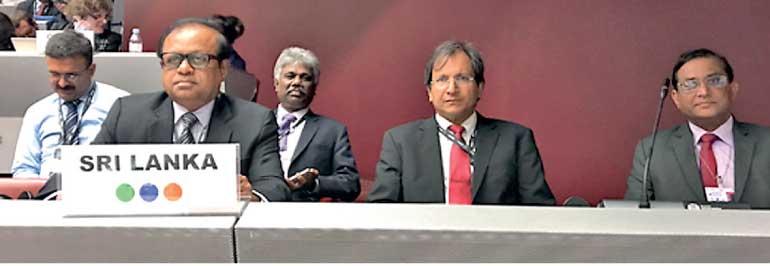Monday Feb 23, 2026
Monday Feb 23, 2026
Monday, 15 May 2017 00:01 - - {{hitsCtrl.values.hits}}

Minister of Science, Technology and Research of Sri Lanka Minister Susil Premajayantha has emphasised the importance of setting up cross-border cooperation among manufacturing and consuming countries, and in this regard, called for establishing a ‘Global Fund’, with the support of manufacturers and voluntary contributors, through which e-waste management in those end-user countries be financed sustainably. He noted that financing e-waste management solely through imposing taxes at the importers level (upstream) or consumers level (downstream) could have negative effects on the access to technology by citizens in developing countries. He also called for increased awareness raising efforts among the public on sustainable waste management.
Minister Premajayantha made these remarks on 5 May presenting his concluding observations of the Ministerial Round Table during the High Level Segment of the 2017, meeting of the Conference of Parties (COPs) to the Basel, Rotterdam and Stockholm (BRS) Conventions, held in Geneva from 4-5 May. The Ministers engaged with each other on 10 broad-based themes. The Basel, Rotterdam and Stockholm Conventions (BRS) covers regulations on management of industrial chemicals, pesticides, persistent organic pollutants and hazardous wastes, and Sri Lanka is party to all three conventions.
During the Ministerial Roundtable held on 4 May, Minister Premajayantha noted that President Maithripala Sirisena being the Minister of Environment of the country is a clear testimony to Sri Lanka’s political commitment for sustainable management of environment and implementation of the BRS Conventions. The Minister said, “On the instructions of the President in 2016, six dedicated divisions were set up in the Presidential Secretariat to deal with environmental issues.” The Minister noted that the President has also taken a personal interest in the implementation of the 2030 Agenda for Sustainable Development, and a number of goals are related to fulfilling the commitments under the BRS conventions.
The Minister also pointed out that in addition to regulations imposed by governments to ban certain hazardous products, it should also encourage research and development to produce environmentally friendly alternatives. In this context, he noted the achievements of the Sri Lanka Institute of Nano-Technology (SLINTEC) as a national example, which has fostered public-private partnership for research and development to produce environmentally sound alternative products.
The Sri Lanka delegation to the meetings of the Conference of Parties (COPs) of BRS Conventions held from 24 April to 5 May in Geneva also included Ambassador Ravinatha Aryasinha, PRUN/Geneva, Udaya Seneviratne, Secretary, Ministry of Mahaweli Development and Environment, Anura Jayathilaka, Director, Environmental Pollution Control and Chemical Management, Prof. Lal Mervin Dharmasiri Ranhotige, Chairman, Central Environment Authority, Jayakody Sumith, Registrar of Pesticides and the officials of the Permanent Mission.